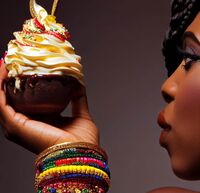Lens of Adaptation: Non-Seeking
 | |
| Lens: Non-Seeking | |
|---|---|
| Beacons | Adaptation |
| Landmarks | Experimenting with Cravings |
Lenses, in the context of the Beacons of Everyday Enlightenment represent more specific concepts and practices through which we can understand the rich meaning of each Beacon. There are Primary Lenses, which are the most commonly understood and most robust meditative concepts, and there are Other Lenses which are a collection of other closely related ideas for that Beacon.
Non-Seeking is about breaking free from the endless pursuit of desires. It's recognizing that constant wanting often leads to a state of dissatisfaction. Instead, the practice of non-seeking encourages us to find contentment in the present moment, without constant longing for something else. The ultimate aim of non-seeking is to foster inner peace and satisfaction, diminishing the turbulence of ceaseless desire and thereby enabling a more harmonious adaptation to life's unfolding.
Landmarks
The Realms of Everyday Enlightenment each have some noticeable Landmarks which show the likely alignment someone within that Realm has with each of the Beacons and their various Lenses. These Landmarks are things that need to be noticed and explored in the context of those Lenses and Beacons. And then through working on the Trails and Guides these Landmarks will serve as markers toward the next Realm where new Landmarks await.
Landmarks of Enrollment
Landmark: Experimenting with Cravings
 | |
| Landmark: Experimenting with Cravings | |
|---|---|
| Beacons | Adaptation |
| Realms | Enrollment |
| Lenses | Non-Seeking |
| Guides | Eating |
| Trails | Learn About Adaptation |
The Landmark of Experimenting with Cravings tests your experiences with cravings and how they affect your thoughts and emotions.
Review these questions to see if you have fully explored this Landmark and are ready to move on.
Landmark Lookouts:
- Discovering Craving: Do you notice that there is a true craving to experience, that there's a strong feeling in your mind that you can "observe" in some way?
- Being Pulled vs Thinking: Can you distinguish between your craving (being pulled) and the mental thoughts that run through your head ("That chocolate looks so good")?
What better way to experiment with cravings than to take it literally, with some sort of sweet dessert...
- Select a snack or drink that you find particularly appealing. Make sure it's something you genuinely enjoy and look forward to having.
- Before you dive right in, take a moment to really look at your chosen treat. Notice its colors, its shape, its texture.
- Close your eyes and inhale. Can you smell the food or drink? What does it remind you of? Or maybe if it doesn't have a smell, test its weight or texture.
- Acknowledge the sense of anticipation building within you. You're eager to dig in, but don't just yet.
- Instead, explore that feeling of craving. It's like a tug in your gut, a mental image that won't go away, an expectation of pleasure.
- Take as much time as you need to really identify that there is a very real thought like "You should eat this now, go ahead and get started" and an emotion associated with that thought.
- Now, slowly start to eat or drink. Really focus on the experience - the texture, the taste, how it feels as you swallow.
- Take your time. With every bite or sip, observe how the intensity of your craving diminishes. What's replacing it? Satisfaction? A sense of calm?
- Reflect on this change. You went from craving to contentment, from anticipation to experience. And it all happened in a few moments.
- Carry this experience into your daily life. Whenever you find yourself desiring something, remember the snack. Recall how the craving came and went, and how the actual experience was just a series of moments, each passing away to make room for the next.
Landmarks of Engagement
Landmarks for this Realm (Engagement) will be added here when those pages are created.
Landmarks of Enrichment
Landmarks for this Realm (Enrichment) will be added here when those pages are created.
Shadows
The Beacons of Everyday Enlightenment provide powerful guidance through the Realms. The Lenses represent different facets of those Beacons, which provide further focus or illumination of that Beacon. On the other hand, Lenses are also accompanied by two types of Shadows which tend to obscure our journey to Enlightenment. The first kind of Shadows are the Looming Shadows, which are the obvious opposite of a given Lens, and should hopefully be easy to avoid and train against once we understand them. The second kind are the Flickering Shadows, which could be confused with the associated Lenses, because they are quite similar to the Lens, while actually being a harmful or negative counterpart. Both types of Shadows should be understood in the context of the Lens and Beacon, and reviewed periodically to ensure our view is not obscured. Within the Lens of Non-Seeking, we find contentment in the present moment, without constant longing for something else.
- Looming Shadow - Obsessive Seeking, is constantly seeking or desiring something else, perpetually dissatisfied, never being content with what is present. The harsh truth is almost everyone is constantly in this state. It's easy to notice, but hard to break out of.
- Flickering Shadow - Passivity, is when the practice of non-seeking evolves into passivity or lack of initiative in life, leading to stagnation rather than contentment. The goal is more about being fulfilled in each moment, and that is nearly impossible through passivity because change is inevitable, and Embracing the Change is the opposite of resisting or denying change.
